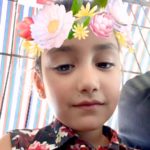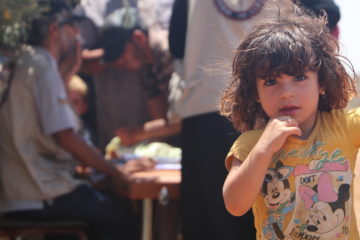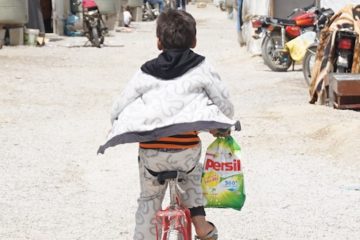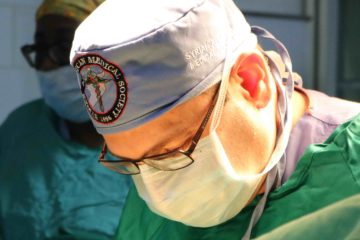August 19, 2016
 Yousef Abu-Salha is a second year medical student at the University of North Carolina- Chapel Hill (UNC). Yousef’s family suffered a tragedy in February 2015 when his two sisters, Yusor and Razan Abu-Salha, and his brother in-law, Deah Barakat, were murdered execution-style in the 2015 Chapel Hill Shooting.Yusor and Razan wore the headscarf and Yousef’s family believes the shooting was a hate crime. Deah, Yusor, and Razan became known globally as “Our Three Winners.” Yusor and Deah were dental students at UNC and were planning the Project Refugee Smiles mission: a trip to Reyhanli, Turkey on the Turkish-Syrian border to provide dental and medical relief to displaced Syrian refugee children. Although Yusor completed a successful mission to a Syrian refugee camp in Kilis, Turkey in 2014, Yusor and Deah did not live to see Project Refugee Smiles fulfilled. Their family, community, and the Syrian American Medical Society (SAMS) are carrying out the mission annually in honor of their legacy. Yousef recounts an experience from the second annual Project Refugee Smiles mission below.
Yousef Abu-Salha is a second year medical student at the University of North Carolina- Chapel Hill (UNC). Yousef’s family suffered a tragedy in February 2015 when his two sisters, Yusor and Razan Abu-Salha, and his brother in-law, Deah Barakat, were murdered execution-style in the 2015 Chapel Hill Shooting.Yusor and Razan wore the headscarf and Yousef’s family believes the shooting was a hate crime. Deah, Yusor, and Razan became known globally as “Our Three Winners.” Yusor and Deah were dental students at UNC and were planning the Project Refugee Smiles mission: a trip to Reyhanli, Turkey on the Turkish-Syrian border to provide dental and medical relief to displaced Syrian refugee children. Although Yusor completed a successful mission to a Syrian refugee camp in Kilis, Turkey in 2014, Yusor and Deah did not live to see Project Refugee Smiles fulfilled. Their family, community, and the Syrian American Medical Society (SAMS) are carrying out the mission annually in honor of their legacy. Yousef recounts an experience from the second annual Project Refugee Smiles mission below.
Triaging during the second clinic day of the Project Refugee Smiles mission, I met two beautiful girls named Salwa and Layla, 8 and 6 years old respectively. Salwa was tall for her age, had a tan sun-kissed skin complexion, shiny black hair, big beautiful black eyes, and rosy cheeks. Layla was smaller, had lighter skin, and was more playful and sociable than her sister. As I examined them in the triage room, I sensed these girls were more stoic than most their age. Salwa didn’t smile much, but she complied with directions and answered my questions about her health and her new life in Reyhanli, Turkey. I gifted them toys to comfort them before the dental visits. One of the dentists and I had purchased three large boxes full from a toy store that morning. Coloring books, colored pencils, bouncy balls, toy trucks, and Barbie dolls were commodities in Reyhanli. Layla smiled, laughed, and began playing with her toys immediately. Salwa, on the other hand, kept a straight face. She showed in her eyes gratitude for my gesture but did not muster a smile.
Salwa and Layla were accompanied by a woman I assumed was their mother. I had them call “mama” over to speak with her. Salwa and Layla’s guardian informed me she was in fact their grandmother. She asked for a moment of privacy, pulled me out of the triage room, and said, “I just want you to know that these girls are special. You see, their parents are martyrs.” Her words were light on her tongue but heavy on my ears and my heart. I was overcome with emotion. Salwa and Layla’s parents had perished as a result of the shelling of heavily populated civilian areas in Syria. These two adorable girls have experienced an unbelievable magnitude of loss, trauma, war, and tragedy already.
Salwa’s stone cold expression now made sense to me. I then noticed a large scar on her left leg. I wondered whether she witnessed her parents’ traumatic passing. Her beautiful eyes had seen more than most adults, let alone 8 year olds. I speculated whether Layla’s innocent playfulness was spared due to her young age, a mercy.
I looked their grandmother in the eyes and prayed for her departed children, the parents of Salwa and Layla. I asked God to accept them among the martyrs, to reunite them in the highest of heavens, and to bless their family both in this life and the next. As an American medical student, I recognize the need for genuine empathy in this setting. As an Arab Muslim, I understand the glorification and elevated status of true martyrs within the culture and the importance of prayer as a form of condolence. Unlike the false media-propagated terrorists’ rhetoric, a martyr is one who dies an innocent victim targeted due to faith, ethnicity, or group of belonging. A true martyr is one who dies in defense of family, human rights, country, or property.
I explained to the grandmother that I have not shared their experience of continued suffering and survival through war, but I could relate to them in a regard. I pointed to the popular silhouette of Our Three Winners, visibly hung on a large banner in the Project Refugee Smiles Clinic. I asked if she knew who the three outlines were. She replied, “Yes, those are the three college students who were murdered in the USA. Make no mistake, they were killed because of their faith.” I was astounded. The elderly lady had no idea how much her words meant to me. I braced myself for the news I would break to her, news that would surprise her, news that hurt me to recall every time, and news that allowed me to identify with Salwa’s possible post-traumatic stress. “Yes, my aunt. Those two girls are my only sisters. That boy is my best friend and brother in-law.” Suddenly, I could see in her eyes the same emotion that overcame me earlier.
I felt an indescribable connection with this woman and her grandchildren, all of us having lost immediate family members whom we believe are martyrs. She prayed for me in a most heartfelt manner. I reciprocated and prayed that we are all united together in front of God on the Day of Judgment. It would be an honor to be gathered among the Syrian people on that day. These people may not have been blessed with this life’s bounties, but if one believes in the afterlife, the next eternal life is promised to them in full.
I expressed to her my love for her two granddaughters and assured they would be in good hands at the clinic. I followed their dental care over the next few days. Salwa’s stone cold demeanor did not change while the dentists worked on her teeth. Unlike the average 8 year old, she was not scared of the needles or the drills. I was proud of her courage, but I was sad at the realization: she learned this fearlessness through immense tribulation. Layla had to return to the clinic due to the extensive work she needed done by the dentists. I was glad however because I was allowed to see her three days in a row.
I utilized the concept of preventative medicine by teaching Layla to brush her teeth twice a day and to floss every night. I taught her using a big bright green dragon figurine, named Fufu. Fufu had human like teeth and could squirt water at the children while they practiced their brushing and flossing. I learned this playful educational method from my late sister Yusor when she volunteered treating refugees in Kilis, Turkey in 2014. Layla, like most kids, loved Fufu. I asked Layla to send my regards to her grandmother. I entrusted her to give Salwa an official Project Refugee Smiles t-shirt with the Our Three Winners silhouette on the back, on my behalf. I knew this six year old would fulfill the favors I asked of her. The Syrian children I encountered in Reyhanli were responsible beyond their ages. I was tearful when Layla left the clinic for the last time. I will never forget Salwa and Layla. One would think I gave them something in terms of healthcare or companionship but they gave me much more. They reinforced my patience, spirit, and dignity through my daily pain and struggle.
I reflected on my encounter with them many times already. Although I was happy to help provide them with limited dental and medical relief, I was saddened to leave them in their state of limited resources. I wished that there was an end in sight to the civil war in Syria. I wished my home country would open its doors to them. I imagined bringing Salwa and Layla back to the USA with me. My parents, having lost two daughters, would be thrilled to raise, educate, and care for such precious young girls. My fellow American citizens and I could learn so much from them in resilience, faith, perseverance, and equality. Salwa and Layla are no better than me, and I no better than them. We all have the same humanity within us. They deserve better.
Although we helped Salwa, Layla, and hundreds of Syrian refugees during our mission, my reflection brought forth a sense of helplessness. I would return in a few days to the land of opportunity. I lost my siblings and my best friend in a senseless heinous act. I live with unimaginable pain, but I am healing and overcoming from my tragedy. My circumstances and resources in the USA allow me to continue to move forward in my life with dignity and purpose. In contrast, many Syrian refugees’ lives are at a standstill. The adults are unemployed, the sick are struggling to find treatment, the high school graduates have no college opportunity, the traumatized, depressed, and anxious have no path to recovery, and the list goes on. I therefore wondered how helpless the Syrian people felt in comparison. The looks on their faces however did not convey helplessness. They shined with dignity, optimism, and a stubborn pride. As I recounted this story and shared my emotions with my brother in-law Farris, he assured me that sometime over the next year, as I reflect over Salwa and Layla, I would be moved to tears. He wasn’t kidding. It has only been two weeks.




